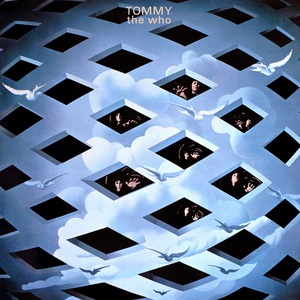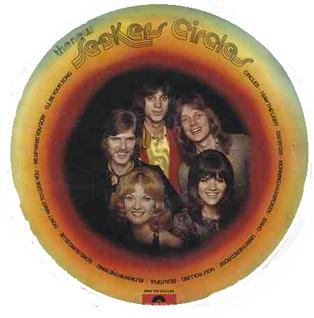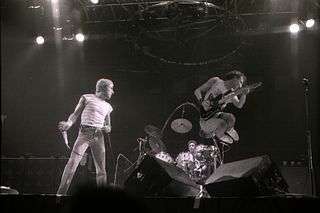
Tommy is the fourth studio album by the English rock band the Who, released on 19 May 1969. Written primarily by guitarist Pete Townshend, Tommy is a double album and an early rock opera that tells the story of the fictional Tommy Walker and his path to becoming a spiritual leader and messianic figure.

The New Seekers were a British pop group, formed in London in 1969 by Keith Potger after the break-up of his group, the Seekers. The idea was that the New Seekers would appeal to the same market as the original Seekers, but their music would have pop as well as folk influences. They achieved worldwide success in the early 1970s with hits including "I'd Like to Teach the World to Sing", "You Won't Find Another Fool Like Me" and "Beg, Steal or Borrow."

Tommy is a 1975 British psychedelic musical fantasy drama film written and directed by Ken Russell and based on the Who's 1969 rock opera album of the same name about a "psychosomatically deaf, mute, and blind" boy who becomes a pinball champion and religious leader. The film featured a star-studded ensemble cast, including the band members themselves, Ann-Margret, Oliver Reed, Eric Clapton, Tina Turner, Elton John, Robert Powell and Jack Nicholson.

"Overture" is a song by English rock band the Who, written by Pete Townshend. The track is one of three instrumental tracks on Tommy, the other two being "Underture" and "Sparks".

"Pinball Wizard" is a song by the English rock band the Who, written by guitarist and primary songwriter Pete Townshend and featured on their 1969 rock opera album Tommy. The original recording was released as a single in 1969 and reached No. 4 in the UK charts and No. 19 on the U.S. Billboard Hot 100.

Then and Now is a 2004 greatest hits compilation album by The Who released internationally by Polydor Records and by Geffen Records in the United States. It features 18 Who classics and two new tracks—"Real Good Looking Boy" and "Old Red Wine"—which were the first Who originals since "Dig" from Pete Townshend's 1989 album The Iron Man. "Real Good Looking Boy" is a tribute to Elvis Presley, and "Old Red Wine" is a tribute to former band member John Entwistle, who died in 2002. The album was re-released in 2007 and replaced "Old Red Wine" with "It's Not Enough" from the 2006 album Endless Wire and "Summertime Blues" was replaced by "Baba O'Riley".

"I'm Free" is a song written by Pete Townshend and performed by the Who on the album Tommy. The song has since been released as a single, becoming one of the best known tracks from Tommy.
The Who Tour 2006–2007 was The Who's first worldwide concert tour since 1997, supporting their Endless Wire album.

Hooligans is a double compilation album of The Who released by MCA Records in 1981. It focuses on Who songs from the 1970s with only the titles "I Can't Explain", "I Can See for Miles" and "Pinball Wizard" from the 1960s. The album reached #52 on the US charts.

Live from Toronto is a double live album by The Who recorded during the last concert of the It's Hard Tour at the Maple Leaf Gardens in Toronto, 17 December 1982. These performances were originally broadcast live on cable TV and FM radio across the U.S. and Canada. It was later released in the early 1980s on VHS video tape.

Live at the Royal Albert Hall is a three-CD live album set by The Who, released in 2003.

Tommy is a soundtrack album by The Who with contributions from numerous artists. The soundtrack was used in the 1975 Tommy film that was based on the original album that was released by The Who in 1969. Pete Townshend oversaw the production of this double-LP recording that returned the music to its rock roots, and on which the unrecorded orchestral arrangements he had envisaged for the original Tommy LP were realised by the extensive use of synthesiser.
The Who Tour 1979 was The Who's first concert tour after the death of original drummer Keith Moon. The tour supported their 1978 album Who Are You, and consisted of concerts in Europe and the United States and acknowledged the band's return to live performance.

Beautiful People is a 1971 album by UK pop group The New Seekers. This was the group's third album and their last one released in the UK on the Philips record label. It was their first to be solely produced by David Mackay, who would guide the group through their most successful period over the next two years.

Circles is a 1972 album by UK pop group The New Seekers. It was the group's sixth album and released at the peak of their success. In the UK the album was notably released in a cut-out circular sleeve.

The Who Tour 1980 was The Who's second concert tour since the death of original drummer Keith Moon, supporting their 1978 album Who Are You.
The Who Tour 2000 was partially in support of The Who's live album The Blues to the Bush and their first full-fledged tour as a five-piece band since The Who Tour 1982.

Together is a 1974 album by British pop group The New Seekers. It features the No. 1 single "You Won't Find Another Fool Like Me" and the top five follow-up "I Get a Little Sentimental Over You". It was the last album the group released before a much-publicised split.

The Who Tour 2012–2013 was their third to feature the 1973 album Quadrophenia. Billed as "Quadrophenia and More", the band played Quadrophenia in its entirety, followed by a selection of their greatest hits. Before starting the tour, the group gave a special performance at the closing ceremonies of the 2012 Summer Olympics.

Farewell Album is the final album released by The New Seekers in their early 1970s hit-making line up. Released in 1974, it is also the group's last release on Polydor Records.


















